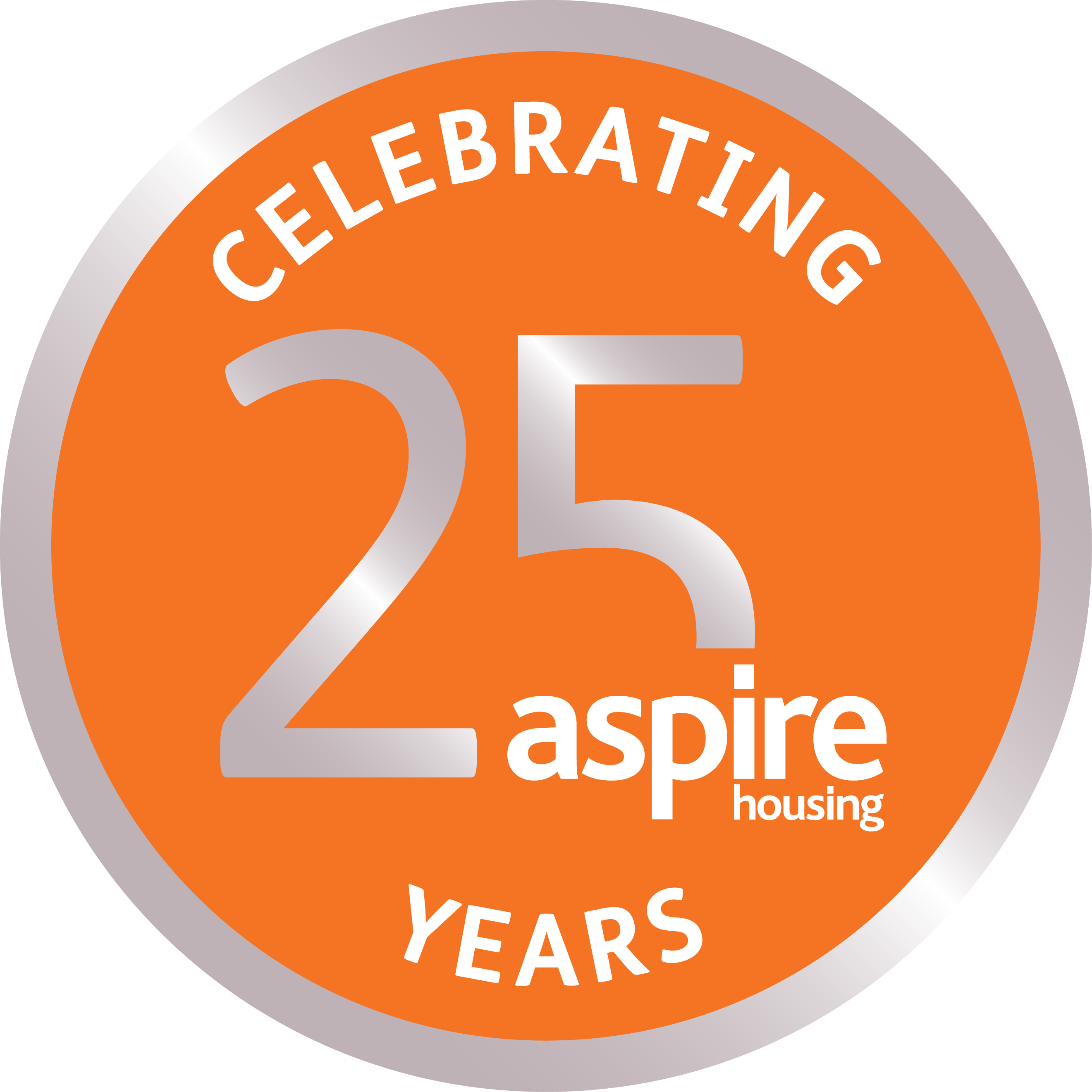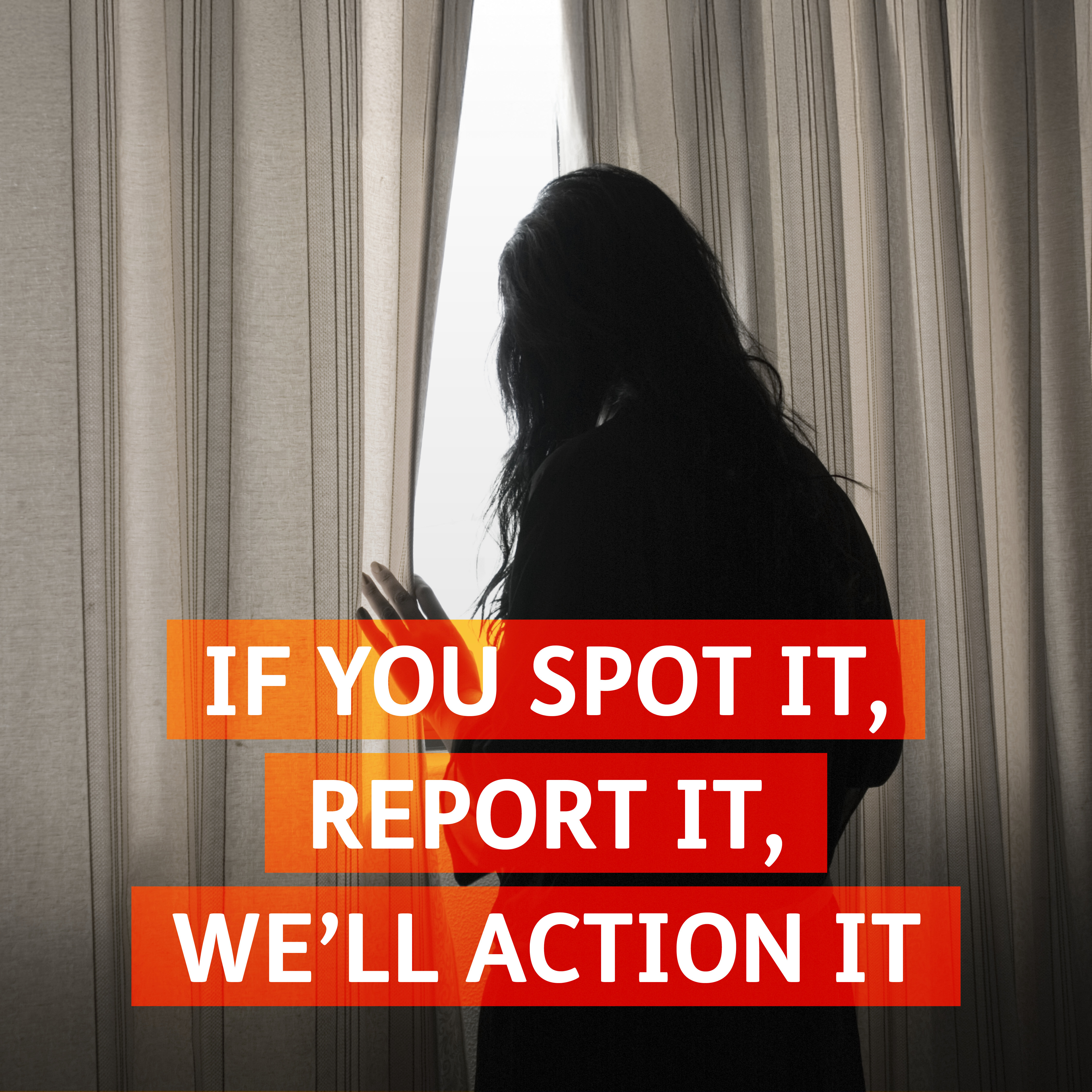
Everyone should feel safe in their own home.
We want everyone living in or around an Aspire Housing home to be able to go about their everyday life without feeling upset, scared, or intimidated.
We know that sometimes anti-social behaviour, also known as ASB can stop this from happening. When it does, we want to know about it, as there are lots of things we can do to help.
- Loud music, shouting, dog barking: Anti-social behaviour only if persistent. Try a friendly word first. If it continues, contact us through MyAccount with details (when, how long, type, loudness). We can provide noise record sheets, arrange mediation, or take action if needed.
- General living sounds: (walking, talking, hoovering) – not normally anti-social behaviour. If you’re disturbed, reach out to your Locality Coordinator or use live chat.
- Examples: Unwanted sexual comments, indecent exposure, drunken behaviour, damaging communal areas
- Anti-social behaviour? Yes. Never put yourself in danger. Report to the Police, then let us know via MyAccount. We may ask you to complete diary sheets to help us support you.
- Fly-tipping: Unlawful dumping of waste is anti-social behaviour. Report council land issues to your local council; if on Aspire land, contact us with details and photos if possible.
- Never put yourself in danger. Report incidents to the Police, then let us know via MyAccount. We may ask you to complete diary sheets.
- Graffiti: If targeted at you, see above. If not, contact us and send a photo if possible. We’ll arrange removal as quickly as possible. For graffiti not on our land, contact your local council.
- Dog fouling: Not anti-social behaviour, but owners can be fined. Try speaking to your neighbour; if not possible or it continues, report via MyAccount (if on our land) or to your local council (if in public areas).
- Dog barking: Only anti-social if persistent. Try a friendly word first. If it continues, contact us via MyAccount. If you’re concerned about animal welfare, contact the RSPCA.
- Dangerous dogs: Anti-social behaviour. If you’re in fear for your safety, contact the Police immediately, then let us know.
In an emergency
If you believe a crime is happening, or if you feel threatened or have been assaulted, contact the police straight away.
In an emergency, call 999. For non-emergencies, call 101.
Your safety always comes first.
What isn’t anti-social behaviour?
If you’re ever unsure or need a bit of advice, our team is here to help. Please send us a message on MyAccount.
What is ASB?
Discover how we work together with customers and the wider community to prevent anti-social behaviour and build safer neighbourhoods.
Take a look at our list above to see what does and doesn’t count as anti-social behaviour, along with the steps you can take next.
If you need to report ASB when our offices are closed, just send us a message through MyAccount and we’ll get back to you as soon as we can.
If you’re experiencing noise issues during the night, it’s best to contact your local council’s Environmental Health team for immediate support.
Mediation can be a positive way to sort out disagreements between neighbours. Our mediators are trained, independent, and impartial—they’re here to help everyone involved find a way forward, without taking sides or passing judgment.
If you’ve been invited to try mediation, it’s because we believe it could help resolve the anti-social behaviour (ASB) issue you’re facing—often more quickly and effectively than other options. Mediation also gives everyone a chance to share how the situation is affecting them, which can lead to better understanding and lasting solutions.
We’ll only suggest mediation if we feel it’s the right approach, and we won’t usually offer it in cases where violence has taken place.
Eviction is always our last resort. We’ll only consider taking legal action to evict a customer after we’ve tried every other way to resolve the anti-social behaviour issue. In most cases, we’re able to sort things out through early intervention—this might include sending warning letters, arranging meetings to talk things through, or making referrals to support agencies and mediation.
We’ll only move to evict someone straight away in very rare and serious situations, such as if there’s been a conviction for a serious crime like the supply of class A drugs, cultivation of class B drugs, murder, or serious assault.
Whenever possible, we work closely with other organisations—like Environmental Health and the police—to help resolve ASB concerns. These agencies have their own powers too, such as issuing noise abatement notices, fixed penalty notices, or even property closure orders.
If you have any concerns or need more advice, our team is here to help—just get in touch my send a message on MyAccount
Keeping an incident diary is really important if you’re experiencing anti-social behaviour. By recording each incident, you help us build a clear picture of what’s happening and how often it occurs. This information allows us to monitor the situation closely and decide on the best next steps to support you.
If we ever need to take legal action, your diary can be crucial. Judges rely on detailed records to understand the seriousness and impact of the problem, so the more information you can provide about each incident, the better.
Try to include as much detail as you can—such as dates, times, what happened, and how it affected you. Good records can make all the difference in helping us resolve the issue.
You won’t always need to complete several incident diaries before we step in. When you first report anti-social behaviour (ASB), we usually take action straight away. Our first response is often to speak directly with the other party involved, and we may send them a warning letter to remind them of the terms of their tenancy agreement.
Keeping an incident diary can still be really helpful, especially if the problem continues. It gives us valuable information to support you and decide on the best next steps.
If you have any concerns or need more support, just let us know—we’re here to help, you can send us a message on MyAccount
We treat all reports of anti-social behaviour confidentially, and we’ll always talk to you before sharing any information with others. Sometimes, we may need to share details with other agencies—like the police, social services, or a medical professional—without your permission, especially if there’s a safeguarding concern involving you, a child, or another vulnerable adult.
We’ll do our best to protect your identity, but it’s important to be realistic. For example, if your complaint is about noise nuisance, your neighbour might be able to guess who reported it. And if the case goes to court and you agree to provide a witness statement, the person involved will receive a copy, so they will know who you are.
Before we take any action, we’ll always discuss it with you to make sure you’re comfortable with the next steps.
Yes, you can report anti-social behaviour anonymously if you prefer. However, please be aware that if you don’t provide your contact details, we won’t be able to get in touch if we need more information or to update you on what action we’ve taken. This might affect the amount of evidence we can gather and could limit the steps we’re able to take to resolve the issue.
If you’re unsure about whether to report anonymously or would like to talk through your options, our team is here to help—just let us know how you’d like to proceed.
If you believe your neighbours might also be experiencing anti-social behaviour, please let us know. Depending on the situation, we can:
- Write to other neighbours to let them know we’ve received reports, and invite them to get in touch if they’re affected too
- Visit the area and speak directly with residents to see if others have witnessed or been impacted by the behaviour
- Work alongside external agencies to help identify who is responsible and to address the problem together
Your information is really valuable in helping us support everyone involved and find a solution. If you have any concerns or want to talk things through, our team is here to help—just reach out when you’re ready.
If the ASB you’re experiencing is so serious that you feel unsafe in your home, please get in touch with us straight away so we can talk it through together.
We don’t usually move customers or those involved as a way of resolving ASB, except in very exceptional circumstances. Our focus is on tackling the problem directly and supporting you to feel safe where you live. This might include putting extra security measures in place or, if needed, applying to the court for an injunction against the person responsible.
You can apply to transfer or exchange your home if you’d like to move, but please be aware that you’ll need to sort out any outstanding issues with your tenancy—like rent arrears—before a move can go ahead.
If you’re worried or need advice about your options, our team is here to help. Would you like more information about transfers, exchanges, or the support we can offer to help you feel safe at home? Just drop us a message on MyAccount
You’ve told us about the anti-social behaviour (ASB) you’ve been experiencing, and we truly understand how frustrating and upsetting this must be—especially when it feels like nothing is happening. Please be assured that we do take every report of ASB seriously and work hard to resolve issues wherever we can.
Sometimes it might seem as though we’re not taking action, but there are reasons why certain cases can take longer to resolve. Often, we need more information or evidence—such as witness statements or records of incidents—to be able to take things further, especially if legal action is needed. Without this, our options can be limited, as we must be able to support any action we take with clear evidence.
We know it can be difficult to come forward or provide details, and we’ll always do our best to support you through the process. There are also times when reports made to us don’t meet the criteria for ASB, or there is not enough independent evidence—such as in cases of noise complaints where there are conflicting accounts and no witnesses.
We want to work with you and others affected to find a way forward. If you’d like to talk through your experience, need advice on gathering evidence, or want more information about what happens next, our team is here to help—just let us know how we can support you.
Yes, under your tenancy agreement, you’re responsible for the behaviour of anyone living with you or visiting your home. If your visitors cause a nuisance or annoyance to others in your neighbourhood, it could affect your tenancy.
If you know that someone staying with you or visiting is causing ASB, it’s important to take reasonable steps to ask them to stop. If the problem isn’t resolved, we may have to consider taking action against your tenancy, which could put your home at risk.
Being evicted for ASB is a very serious matter and would only happen if a court decides it’s necessary.
If you are evicted for ASB, you’ll usually be classed as ‘intentionally homeless’. This means the eviction could have been avoided if the behaviour hadn’t happened. Because of this, the local council may not offer you another home, and it can also make it much harder to find a place with a private landlord, as we wouldn’t be able to provide a positive reference.
If you’re worried about your situation or need support, please reach out to us. We’re here to help you understand your options and work with you to prevent things from reaching this stage.

